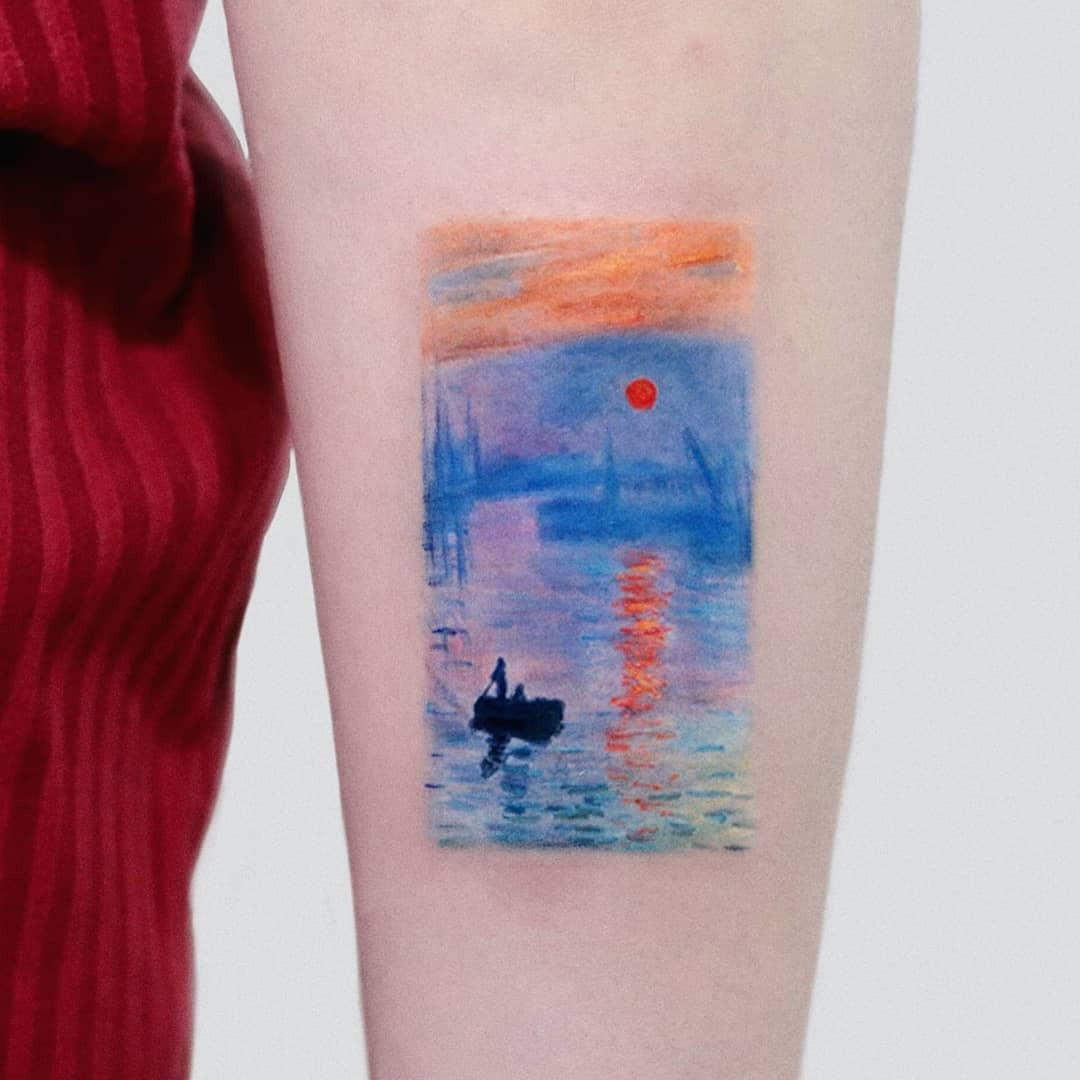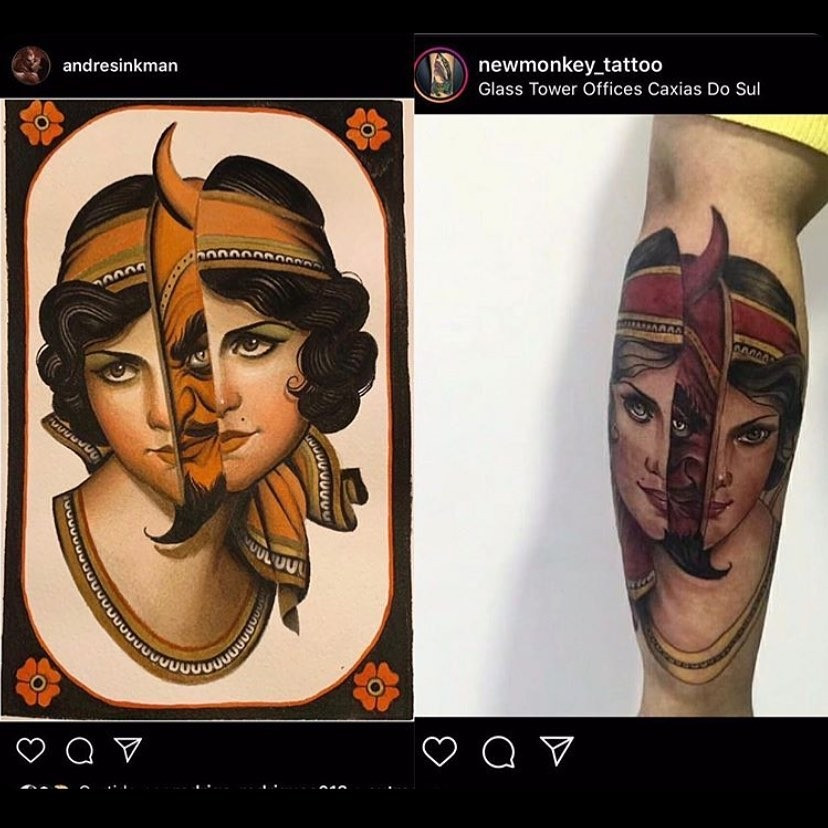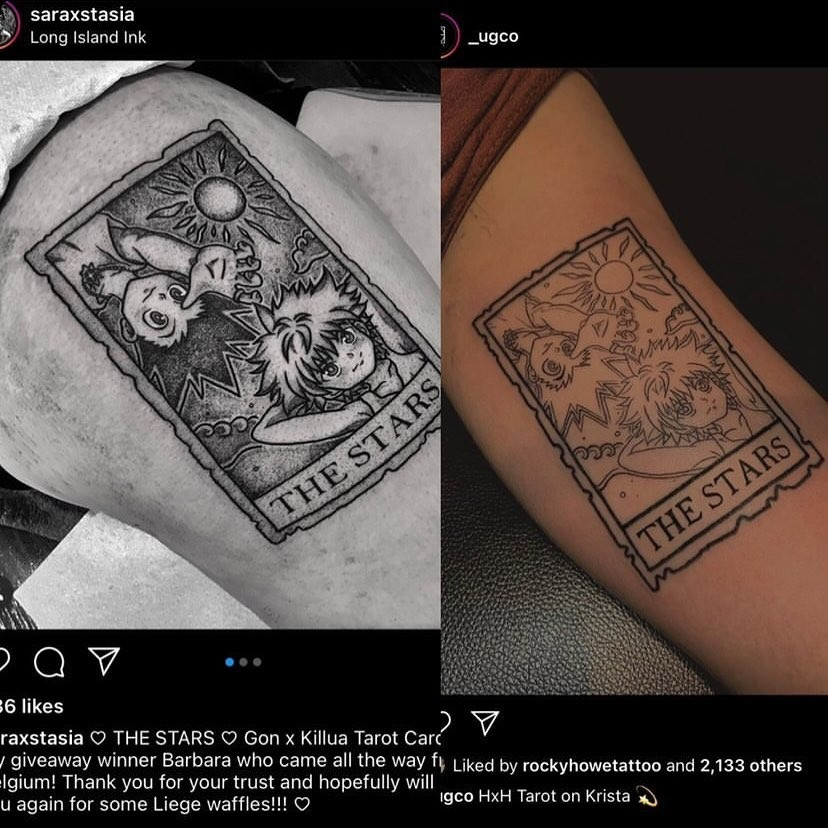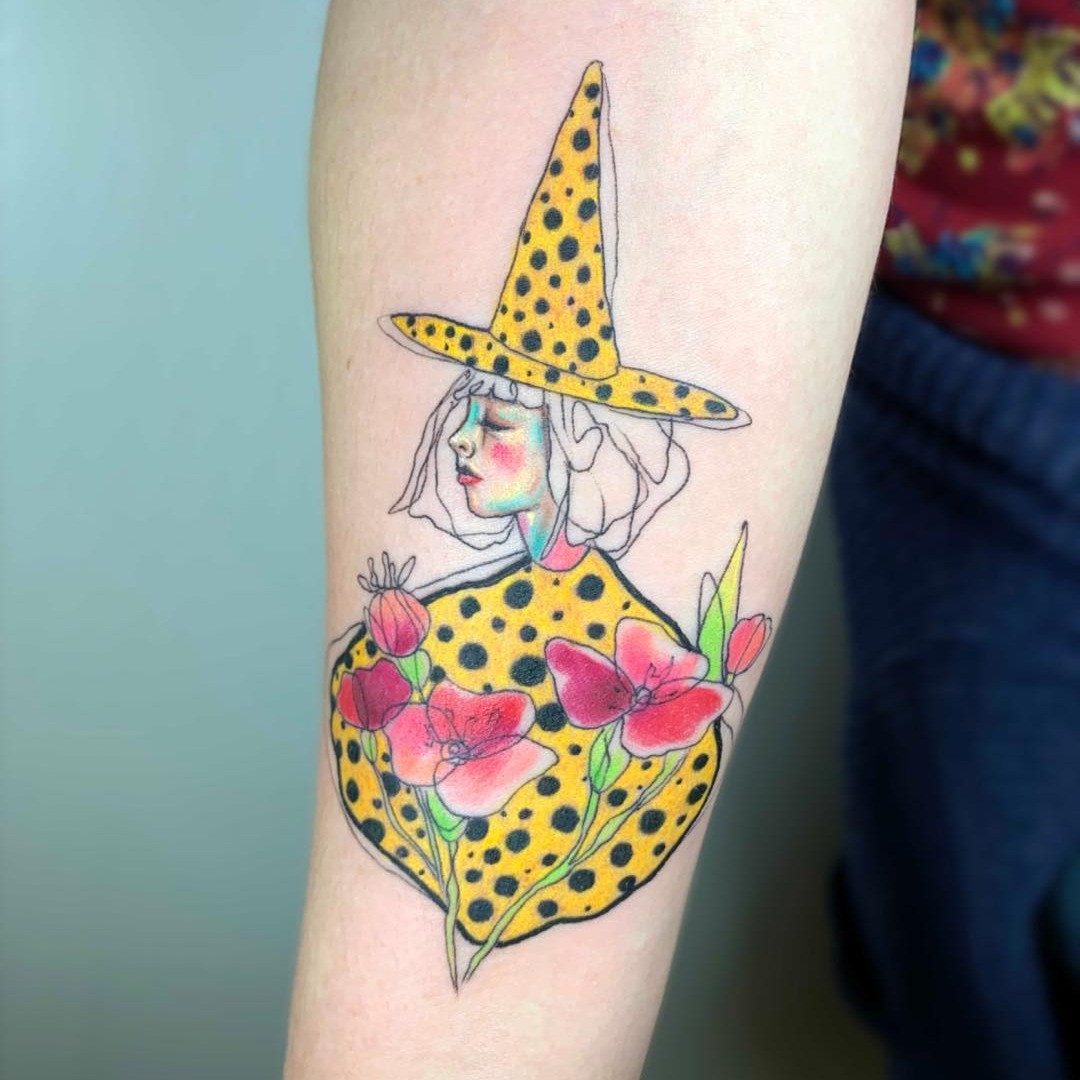Can Tattoo Artists Copy A Picture? Yes, but it’s complex. At tattooat.com, we dive into the legal, ethical, and creative aspects of tattoo artistry. We will address the implications of tattoo design replication. Explore the nuances of intellectual property and copyright in the tattoo world with us, and ensure your ink is both unique and legally sound.
1. Understanding Tattoo Copyright
Who owns the copyright to a tattoo design?
The tattoo artist generally owns the copyright to the original design of a tattoo. This is especially true if the tattoo is a custom piece created specifically for you. According to the Copyright Alliance, the rights to reproduce, display, and create derivative works based on the tattoo belong to the artist. This means that while you own the skin on which the tattoo resides, the artist owns the artistic expression. The artist has intellectual property rights over the design.
Diving Deeper into Tattoo Copyright
This concept can be tricky, but it’s vital for both tattoo artists and clients to understand. Copyright law protects original works of authorship, including artistic creations like tattoo designs. To be copyrightable, a tattoo design must be original and possess at least a minimal degree of creativity. Here’s what you need to consider:
- Originality: The design must be created by the artist and not copied from another source.
- Creativity: The design must have some element of artistic expression, such as unique imagery or composition.
- Collaboration: If you collaborate with the artist on the design, you may share ownership of the copyright.
Alt Text: Van Gogh-inspired tattoo showcasing artistic creativity and detail by Hakan Adik
What Rights Does Copyright Grant?
Copyright grants the artist several exclusive rights, including:
- Reproduction: The right to make copies of the design.
- Distribution: The right to sell or otherwise distribute copies of the design.
- Display: The right to publicly display the design.
- Derivative Works: The right to create new works based on the original design.
The Implications for Clients
As a client, you have the right to display your tattoo, such as by showing it off on social media. However, you cannot reproduce the tattoo for commercial purposes without the artist’s permission. For example, you can’t print the tattoo design on merchandise and sell it without violating the artist’s copyright.
Real-World Examples
Consider the case of a celebrity with a unique tattoo design. While the celebrity can certainly display their tattoo, they can’t use it to endorse products or create a clothing line featuring the design without the tattoo artist’s consent. Doing so could lead to a copyright infringement lawsuit.
2. Can a Tattoo Artist Copy a Drawing?
Is it legal for tattoo artists to replicate existing artwork?
While technically a tattoo artist can copy a drawing, it’s a gray area legally and ethically. Tattooing someone else’s artwork without permission can infringe on the original artist’s copyright. Most reputable artists prefer to create original designs or significantly alter existing ones to avoid copyright issues and maintain creative integrity. According to ethical standards, directly copying another artist’s work is frowned upon in the tattoo community.
The Ethical Considerations
Beyond the legal aspects, there are significant ethical considerations. Copying another artist’s work is often seen as disrespectful and unprofessional. Tattoo artists take pride in their creativity and originality, and replicating someone else’s design can undermine their reputation.
Why Originality Matters
Originality is highly valued in the tattoo world. Clients often seek out artists who can create unique, custom designs that reflect their personal style and preferences. An artist who simply copies existing artwork may not be able to provide this level of personalization.
The Risk of Lawsuits
Although it may seem unlikely, there is a risk of legal action if a tattoo artist copies a copyrighted drawing without permission. The copyright holder could sue the tattoo artist for infringement, seeking damages and an injunction to stop the artist from further reproducing the design.
The Importance of Seeking Permission
If you want a tattoo based on someone else’s artwork, the best approach is to seek permission from the original artist. Many artists are willing to grant permission, especially if you offer to compensate them for the use of their design. This can help you avoid legal issues and ensure that you’re respecting the original artist’s rights.
Alt Text: Tattoo mirroring a painting by Andres, highlighting the concept of artistic replication; sourced from tattoocopycats IG.
Case Studies
Consider the example of Micah Ulrich, an artist known for his occult-inspired designs. Many people have chosen to get his artwork tattooed on their skin. Ulrich’s approach is to ask that anyone using his artwork for a tattoo purchase one of his prints or items from his online shop. This allows him to receive compensation for the use of his designs and maintain control over his intellectual property.
Transformative Use
One way to avoid copyright issues is to make transformative changes to the original artwork. This means altering the design in a significant way so that it becomes a new, original work. For example, a tattoo artist could take inspiration from a drawing but add their own unique style, colors, or elements to create a completely different tattoo design.
3. Replicating a Tattoo: Is It Okay to Get the Same Tattoo as Someone Else?
What are the implications of duplicating someone else’s tattoo?
Legally, you can replicate a tattoo design. However, ethically, it’s questionable. Most reputable tattoo artists won’t copy another artist’s original work directly out of respect for their creativity. If you’re inspired by a tattoo, consider asking the artist to create a unique variation or design something similar in their own style. This way, you get a tattoo you love without disrespecting another artist’s work.
The Social Implications
Beyond the legal and ethical considerations, there are also social implications to consider. Getting the same tattoo as someone else can be seen as unoriginal or even disrespectful, especially if the tattoo is a unique design created for that person.
The Importance of Personalization
Many people get tattoos as a form of self-expression. Replicating someone else’s tattoo can undermine this personal connection, making the tattoo feel less meaningful. Adding a personal touch to the design can make it more special and unique to you.
Finding Inspiration, Not Replication
If you’re inspired by a tattoo you’ve seen, consider using it as a starting point for your own design. Work with a tattoo artist to create a variation that reflects your personal style and preferences. This can result in a tattoo that is both meaningful and original.
Contacting the Original Artist
If you’re a fan of an artist’s work, consider contacting them directly for a tattoo. This can ensure that you’re getting a high-quality tattoo that is true to the artist’s style. It also shows respect for the artist’s creativity and originality.
Alt Text: Comparison of an original tattoo and a replicated version, highlighting the debate surrounding tattoo duplication; sourced from tattoocopycats IG.
The Risks of Copying
Recreating someone else’s work without any transformative changes is technically considered copyright infringement. Artists who value creativity and craftsmanship will not entertain the notion of “stealing” someone else’s design. Additionally, the tattoo artist you choose to recreate another artist’s work may not do it as beautifully as the original artist.
Choosing a Reputable Artist
When getting a tattoo, it’s essential to choose a reputable artist who values originality and creativity. Look for an artist with a strong portfolio of custom designs and a commitment to ethical practices. This can help you ensure that you’re getting a tattoo that is both high-quality and respectful of other artists’ work.
4. Tattoo Ownership: Who Owns the Rights?
Do you have full rights to your tattoo once it’s on your skin?
You own the physical tattoo on your skin. However, the tattoo artist retains the copyright to the design. This means you can’t reproduce the tattoo for commercial purposes without permission. Displaying it is fine, but using it to promote products could lead to legal issues. According to copyright law, the artist holds the intellectual property rights.
Understanding Your Rights
While you own the physical tattoo on your skin, you do not own the copyright to the design itself. This means that you cannot legally reproduce the image commercially or use it to profit from it in any way without the artist’s permission.
Acceptable Display vs. Commercial Use
Showing off your new tattoo on social media or at events is generally considered an acceptable display. However, using the tattoo’s imagery to promote a product or separating the tattoo from the skin and using it as an independent design would likely be deemed copyright infringement.
The Lebron James Case
A notable example of this is the lawsuit between Take Two Interactive and the tattoo licensing company Solid Ink Sketches. The legal dispute arose when Take Two Interactive featured Lebron James’ tattoos on his avatar within the game. Solid Ink Sketches felt that the depiction of his tattoos was copyright infringement, arguing that the game developers did not need to include the tattoo as an identifying component and that the removal of the tattoo from Lebron’s skin to an avatar was intellectual theft.
Alt Text: Screenshot showcasing tattoos in an NBA video game, illustrating copyright considerations in digital representations.
The Outcome
Ultimately, the court ruled that the use of the tattoos in the game was considered “fair use” because the tattoos were displayed as part of James’ likeness, and their inclusion did not harm the tattoo artists’ ability to profit from their work.
Key Takeaways
- You own the physical tattoo, but the artist owns the copyright to the design.
- Displaying your tattoo is generally acceptable, but commercial use requires the artist’s permission.
- Copyright infringement can occur even if the tattoo is part of a larger image or representation.
5. Legal Precedents: The Mike Tyson Tattoo Case
What landmark case highlights tattoo copyright issues?
The case of Whitmill vs Warner Bros, involving Mike Tyson’s tattoo, is a key example. The tattoo artist sued Warner Bros for copyright infringement after they replicated the tattoo on another character in “The Hangover 2.” This case highlights that tattoos can be copyrighted, and unauthorized use can lead to legal action. According to legal experts, this case clarified the extent of copyright protection for tattoo designs.
The Details of the Lawsuit
In this lawsuit, tattoo artist S. Victor Whitmill sued Warner Bros for tattoo copyright infringement after seeing his unique design being used to promote the film “The Hangover 2”. Warner Bros recreated Mike Tyson’s tribal face tattoo on another character within the film.
The Copyright Claim
Tyson’s tattoo artist had registered the design previously with the US Copyright Office and had also asked for Tyson to sign an agreement stating that he would not use the tattoo for commercial endeavors. This gave the artist strong grounds to sue for copyright infringement.
Alt Text: Mike Tyson’s iconic tattoo as featured in “The Hangover,” raising copyright questions about replicating tattoo designs.
The Outcome and Implications
Like many other copyright tattoo cases, the case was settled out of court for an undisclosed sum of money. This case set a precedent for future copyright claims involving tattoos, highlighting the importance of obtaining permission before reproducing a tattoo design.
Registering Your Designs
If you are a tattoo artist, you should register your designs with the US Copyright Office to protect yourself. This additional step has helped creators protect their intellectual property more fiercely, leaving less room for interpretation as to whether or not copyright infringement has occurred.
Understanding Copyright Requirements
For a tattoo to be protected under copyright, it must be original to the artist, and it must be shown to possess at least a minimal amount of creativity. If you assisted your artist in the actual design and layout of your tattoo, then the tattoo is considered a collaboration, in which case both of you would “own” the rights to the piece.
6. Tattoo Styles and Copyright
How does copyright apply to different tattoo styles?
Copyright applies to all original tattoo designs, regardless of style. However, the complexity and uniqueness of the design can affect the degree of protection. Custom, intricate designs are more likely to be protected than simple, generic ones. According to legal analysts, the level of artistic expression determines the extent of copyright protection.
The Basics of Copyright Protection
Copyright law protects original works of authorship, including artistic creations like tattoo designs. This protection extends to various tattoo styles, from traditional to modern and everything in between.
Factors Affecting Copyright Protection
Several factors can affect the degree of copyright protection afforded to a tattoo design:
- Originality: The design must be created by the artist and not copied from another source.
- Creativity: The design must have some element of artistic expression, such as unique imagery or composition.
- Complexity: More complex and intricate designs are generally more likely to be protected.
Common Tattoo Styles
Here are some common tattoo styles and how copyright might apply to them:
| Style | Description | Copyright Considerations |
|---|---|---|
| Traditional | Bold outlines, limited color palette, classic imagery | While individual elements may not be copyrightable, a unique combination or arrangement could be protected. |
| Realism | Highly detailed, lifelike representations of subjects | The artist’s skill in capturing the likeness and details of the subject can be protected. |
| Watercolor | Soft, flowing colors, mimicking watercolor paintings | The artist’s unique application of color and technique can be protected. |
| Geometric | Precise lines, shapes, and patterns | The artist’s arrangement and combination of geometric elements can be protected. |
| Blackwork | Bold, solid black designs | While blackwork can be simple, intricate patterns and unique compositions can be protected. |
| Illustrative | Detailed line work, often resembling illustrations from books or comics | The artist’s unique style and composition can be protected. |
| Neo-Traditional | A modern take on traditional tattoos, with brighter colors and more detail | Similar to traditional tattoos, a unique combination of elements and artistic flair can be protected. |
| Japanese (Irezumi) | Traditional Japanese imagery, such as dragons, koi fish, and cherry blossoms | The artist’s unique interpretation and arrangement of these classic motifs can be protected. |
| Tribal | Bold, geometric patterns often inspired by indigenous cultures | While individual patterns may be traditional, a unique combination or adaptation can be protected. |
| Minimalist | Simple, understated designs | While individual elements may not be copyrightable, a unique arrangement or concept could be protected. |
Best Practices for Tattoo Artists
- Create original designs that reflect your unique style and creativity.
- Keep detailed records of your design process.
- Consider registering your designs with the US Copyright Office.
- Obtain permission before using someone else’s artwork or imagery.
- Educate your clients about copyright law and their rights.
7. Protecting Your Tattoo Designs: Advice for Tattoo Artists
What steps can tattoo artists take to secure their work?
Register your designs with the US Copyright Office. This provides legal protection against unauthorized reproduction. Document your creative process and retain all sketches and preliminary designs. Use watermarks or digital signatures on online images of your work. According to legal experts, these measures strengthen your claim to ownership.
The Importance of Documentation
One of the most important steps you can take to protect your tattoo designs is to document your creative process. This includes keeping detailed records of your sketches, preliminary designs, and final artwork. This documentation can serve as evidence of your ownership if a copyright dispute arises.
Registering Your Designs
Registering your tattoo designs with the US Copyright Office provides legal protection against unauthorized reproduction. Copyright registration creates a public record of your ownership and gives you the right to sue for infringement in federal court.
Using Watermarks and Digital Signatures
Using watermarks or digital signatures on online images of your work can help prevent unauthorized use. A watermark is a semi-transparent overlay that displays your name or logo on the image, making it more difficult for others to copy and use without your permission. A digital signature is an electronic stamp that verifies the authenticity and integrity of the image.
Monitoring for Infringement
Regularly monitor the internet for unauthorized uses of your tattoo designs. This can include searching for your designs on social media, online marketplaces, and other websites. If you find evidence of infringement, take action to protect your rights.
Sending Cease and Desist Letters
If you find someone using your tattoo designs without permission, send them a cease and desist letter. This is a formal letter demanding that they stop using your artwork immediately. The letter should include a clear statement of your copyright ownership, a description of the infringing activity, and a demand for compliance.
Legal Action
If the infringer does not comply with your cease and desist letter, you may need to take legal action to protect your rights. This can include filing a lawsuit for copyright infringement in federal court.
Educating Your Clients
Educate your clients about copyright law and their rights. Explain that while they own the physical tattoo on their skin, you retain the copyright to the design. This can help prevent misunderstandings and ensure that your clients respect your intellectual property rights.
Alt Text: Tattoo inspired by Yayoi Kusama, showcasing illustrative flower portrait with polkadots by Patrick Cat Tattoo, exemplifying unique artistic interpretation.
8. The Artist’s Perspective: Ethics and Creativity in Tattooing
How do tattoo artists view copying and inspiration?
Most artists value originality and creative expression. They see copying as disrespectful and unprofessional. Inspiration is acceptable, but artists are expected to transform the source material into something unique. Pitta Kkm, a respected tattoo artist, emphasizes the importance of creating original designs to maintain the integrity of the art form.
The Importance of Originality
Tattoo artists take pride in their creativity and originality. They see their work as a form of artistic expression, and they strive to create unique designs that reflect their personal style and vision. Copying another artist’s work is seen as disrespectful and undermines the value of originality.
Inspiration vs. Copying
While copying is frowned upon, inspiration is an essential part of the creative process. Tattoo artists often draw inspiration from various sources, such as nature, art history, and popular culture. However, they are expected to transform the source material into something unique and original.
The Transformative Process
The key to using inspiration ethically is to make transformative changes to the original source material. This means adding your own unique style, elements, and interpretations to create a design that is distinct from the original.
Respecting Other Artists
Respect for other artists is a fundamental principle in the tattoo community. Copying another artist’s work is seen as a violation of this principle and can damage your reputation. Building a strong reputation based on originality and creativity is essential for success as a tattoo artist.
Maintaining Creative Integrity
Maintaining creative integrity is essential for tattoo artists. This means staying true to your artistic vision and avoiding the temptation to copy or imitate others. By developing your own unique style and approach, you can create tattoos that are both meaningful and original.
Client Collaboration
Collaborating with clients can also help ensure that your tattoos are original and meaningful. By involving your clients in the design process, you can create tattoos that reflect their personal style and preferences. This can result in tattoos that are both unique and deeply personal.
9. Finding Inspiration Responsibly
How can clients find tattoo inspiration without encouraging copying?
Gather ideas from various sources, but focus on the overall theme or style rather than specific designs. Share your ideas with a tattoo artist and allow them to create an original design based on your inspiration. Support artists who create original content and avoid requesting exact replicas of existing tattoos. According to creative consultants, this approach fosters originality and respect.
The Importance of Research
Before getting a tattoo, it’s essential to do your research and gather inspiration from various sources. This can include browsing tattoo portfolios online, visiting tattoo conventions, and talking to tattoo artists.
Focusing on Themes and Styles
When gathering inspiration, focus on the overall themes and styles that you like, rather than specific designs. This will give your tattoo artist more freedom to create an original design that reflects your personal style and preferences.
Avoiding Exact Replicas
Avoid requesting exact replicas of existing tattoos. This is not only disrespectful to the original artist but also limits your own creative expression. Instead, use the existing tattoo as a starting point and work with your tattoo artist to create a unique variation that is tailored to you.
Supporting Original Artists
Support artists who create original content by commissioning custom designs and purchasing their artwork. This helps to encourage creativity and innovation in the tattoo community.
Communicating with Your Artist
Communicate your ideas and inspiration clearly to your tattoo artist. This will help them understand your vision and create a tattoo that meets your expectations.
Trusting Your Artist’s Expertise
Trust your artist’s expertise and allow them to bring their own creative ideas to the table. This can result in a tattoo that is even better than you imagined.
Being Open to Suggestions
Be open to suggestions from your tattoo artist. They may have ideas that you haven’t considered, and their expertise can help you create a truly unique and meaningful tattoo.
10. Navigating Copyright as a Client
What should you know about copyright when getting a tattoo?
Understand that the tattoo artist owns the copyright to the design, not you. Avoid using your tattoo for commercial purposes without the artist’s permission. If you want a tattoo based on existing artwork, seek permission from the original artist. According to legal advisors, these steps can prevent copyright issues.
Understanding Copyright Ownership
As a client, it’s essential to understand that the tattoo artist owns the copyright to the design, not you. This means that you cannot legally reproduce the tattoo for commercial purposes without the artist’s permission.
Displaying Your Tattoo
You are free to display your tattoo in public, such as by showing it off on social media or at events. However, you cannot use the tattoo’s imagery to promote a product or service without the artist’s consent.
Seeking Permission
If you want a tattoo based on existing artwork, seek permission from the original artist. This shows respect for their creativity and helps you avoid copyright issues.
Collaborating on Designs
Collaborating with your tattoo artist on the design can also help ensure that your tattoo is original and meaningful. By involving yourself in the design process, you can create a tattoo that reflects your personal style and preferences.
Being Aware of Your Rights
Be aware of your rights as a client and the rights of the tattoo artist. This can help you avoid misunderstandings and ensure that you are respecting the artist’s intellectual property rights.
Asking Questions
Don’t hesitate to ask your tattoo artist questions about copyright law and your rights. They should be able to explain the legal aspects of tattooing and help you navigate any potential issues.
Protecting Yourself
Protect yourself by obtaining a written agreement from your tattoo artist that clarifies the ownership of the design and your rights as a client. This can help prevent disputes and ensure that you are both on the same page.
Tattooing is an art form, and like all art forms, it is subject to copyright laws. By understanding these laws and respecting the rights of tattoo artists, you can ensure that your tattoos are both beautiful and legally sound.
Ready to explore the world of tattoos with confidence? Visit tattooat.com for inspiration, artist recommendations, and expert advice on all things tattooing. Find your perfect design and connect with talented artists today! Whether you’re in Portland or anywhere else in the USA, we’re here to guide you on your tattoo journey. Check out our extensive collection of tattoo designs, find reputable artists, and learn everything you need to know about tattoo aftercare. Your dream tattoo awaits! Address: 1825 SW Broadway, Portland, OR 97201, United States. Phone: +1 (503) 725-3000. Website: tattooat.com.
Frequently Asked Questions (FAQs)
1. Can a tattoo artist copy a picture exactly?
While technically possible, copying a picture exactly can lead to copyright issues and is generally considered unethical in the tattoo community.
2. Who owns the copyright to a tattoo?
The tattoo artist who created the original design owns the copyright, even after the tattoo is on your skin.
3. Is it illegal to get the same tattoo as someone else?
It’s not illegal, but it can be seen as disrespectful to the original artist and the person who has the tattoo.
4. What is the Mike Tyson tattoo case about?
It’s a lawsuit where the tattoo artist sued Warner Bros for replicating Mike Tyson’s tattoo in “The Hangover 2” without permission, highlighting tattoo copyright issues.
5. How can tattoo artists protect their designs?
They can register their designs with the US Copyright Office, document their creative process, and use watermarks on online images.
6. Can I use my tattoo for commercial purposes?
No, you need permission from the tattoo artist to use the tattoo for commercial purposes, as they own the copyright.
7. What is considered “fair use” of a tattoo design?
Displaying the tattoo on your body is generally considered fair use, but commercial reproduction requires the artist’s consent.
8. How do I find tattoo inspiration without encouraging copying?
Focus on the overall theme or style and let your tattoo artist create an original design based on your inspiration.
9. What should I do if I want a tattoo based on existing artwork?
Seek permission from the original artist to avoid copyright issues and show respect for their work.
10. Is it okay to modify an existing tattoo design for my own tattoo?
Yes, but making significant transformative changes is important to avoid copyright infringement and create something unique.





